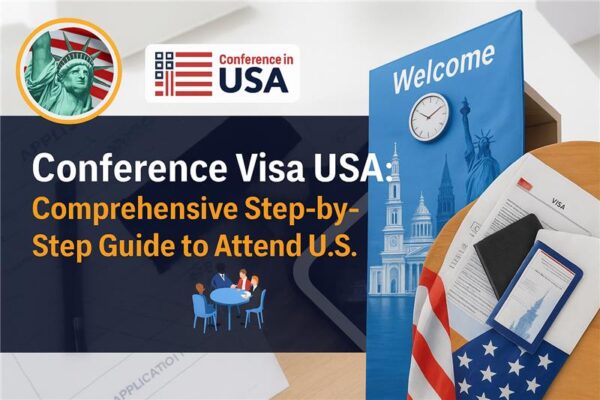- What is a Conference Visa USA?
- Types of U.S. Visas Utilized for Conferences
- 1. B-1 Visa (Business Visitor Visa)
- 2. J-1 Visa (Exchange Visitor Visa)
- 3. F-1 Visa (Student Visa)
- 4. O-1 Visa (Individuals with Extraordinary Ability)
- 5. Visa Waiver Program (VWP)
- USA Conference Visa Requirements
- Step-by-Step: How to Apply for a Conference Visa USA
- Step 1: Register for the Conference
- Step 2: Select the Right Visa
- Step 3: Complete the DS-160 Form
- Step 4: Pay the Visa Application Fee
- Step 5: Schedule a Visa Interview
- Step 6: Attend the Interview
- Step 7: Wait for Decision
- Common Mistakes to Avoid
- Keys to Successful Approval
- Comparison: Conference Visa (B-1) vs Tourist Visa (B-2)
- Frequently Asked Questions (FAQs)
- 1. Can I visit a conference on a tourist visa (B-2)?
- 2. How long may I remain in the U.S. on a B-1 visa?
- 3. What is to be included in the conference invitation letter?
- 4. What happens if my visa is refused?
- 5. Must I provide flight and hotel reservations?
- Although not required, having your travel and hotel reservations handy can further support your case at the interview.
- 6. How early should I apply for my visa?
- 7. Can I work in the U.S. using a conference visa?
- 8. Can I travel to other U.S. cities once I am past the conference?
I am a seasoned professional with over 9 years of transformative experience in the domains of molecular biology, immunology, and clinical research. With a career that spans from 2006 to 2018, my journey has been marked by a relentless pursuit of scientific excellence and an unwavering commitment to improving healthcare outcomes through groundbreaking research. I have worked at one of India’s premier medical institutions, AIIMS(All India Institute of Medical Sciences), where I contributed significantly to the fields of molecular biology and clinical research. My expertise in protein analysis and genetic studies allowed me to identify potential biomarkers and improve diagnostic accuracy, contributing to better healthcare outcomes for patients. Notably, the research work has been published in prestigious scientific journals such as the Indian Journal of Ophthalmology and the British Journal of Ophthalmology.
Publication in these esteemed journals reflects my commitment to advancing medical science and sharing insights with the global research community. These publications highlight my expertise in areas ranging from gene polymorphism and immune response mechanisms to the effects of chronic drug therapy, all contributing to the larger body of scientific knowledge. My passion for scientific communication led me to pursue an Executive Diploma in Medical Writing from CliMed Research Solutions and Curio Training and Research Institute (CTRI), India. This certification has further refined my ability to bridge the gap between complex scientific research and its practical applications in healthcare. My passion for content writing drives me to continuously create content that derives engagement ,build trust, and leaves a lasting impression on readers”.




